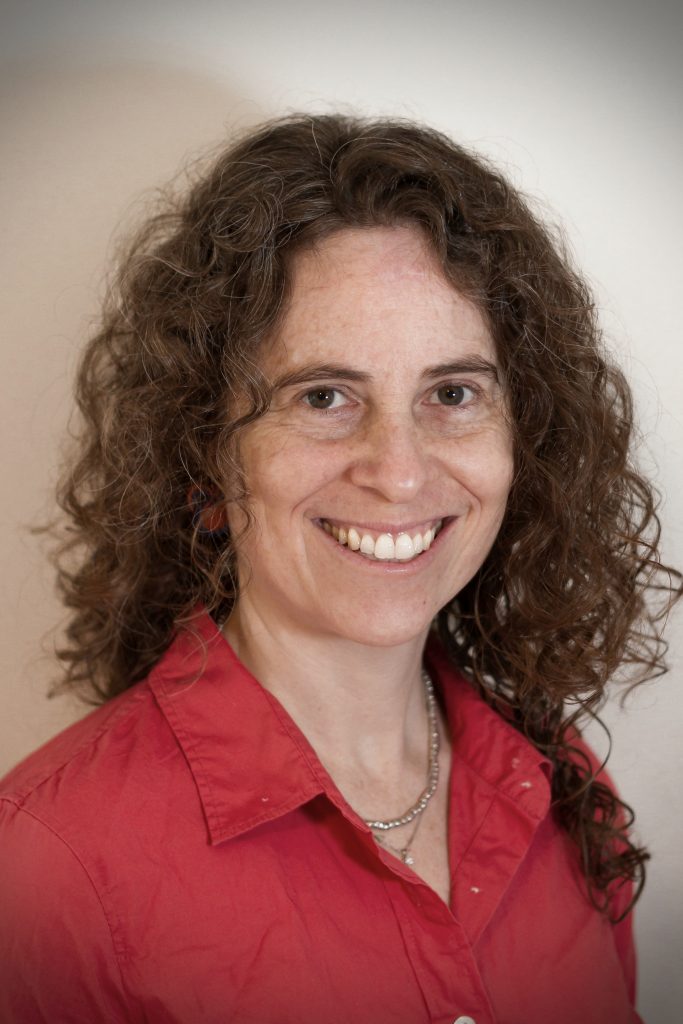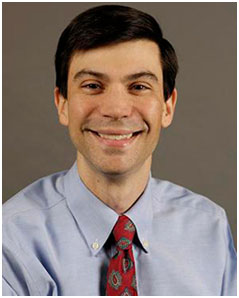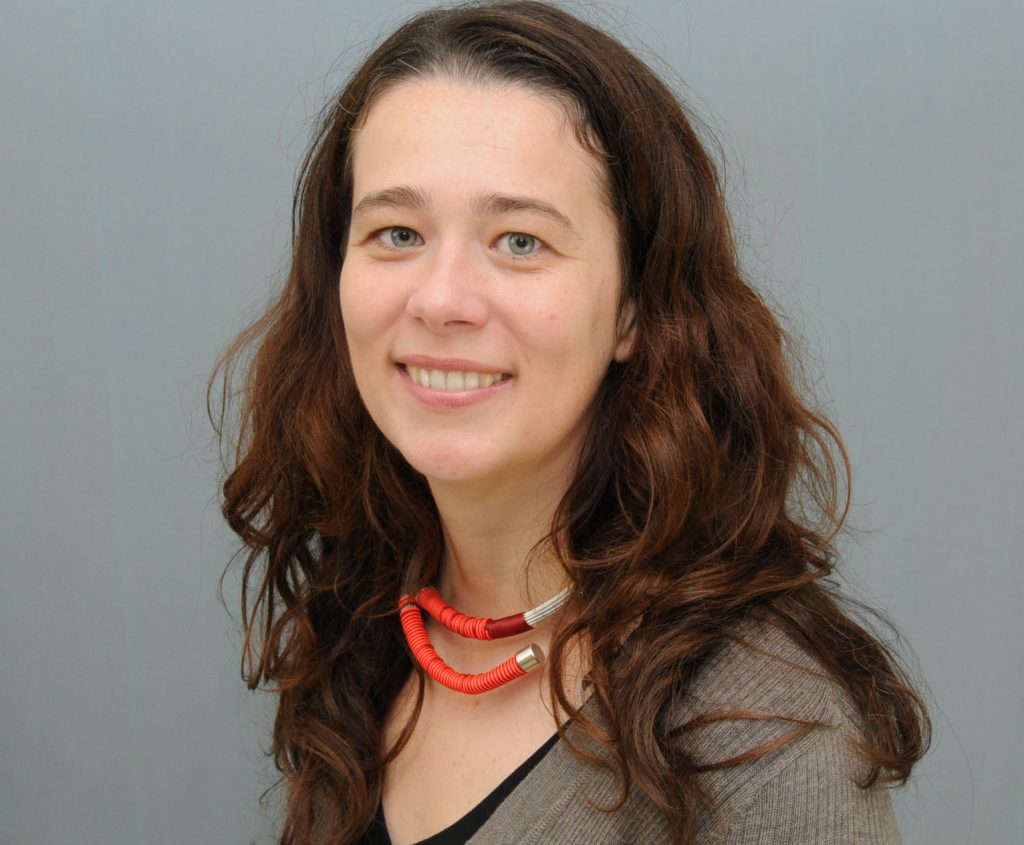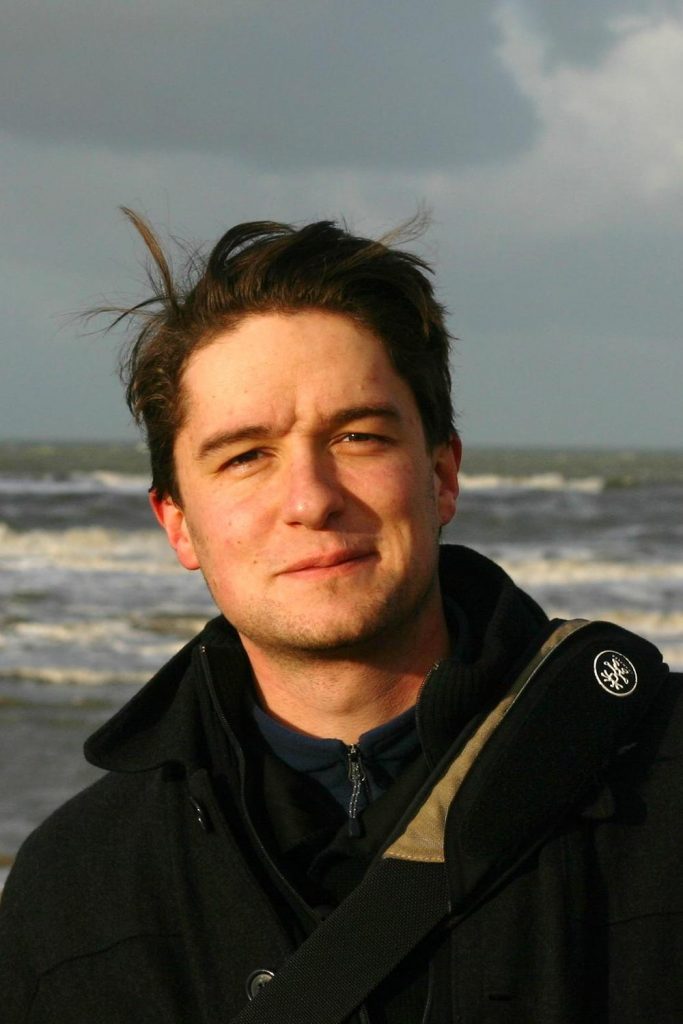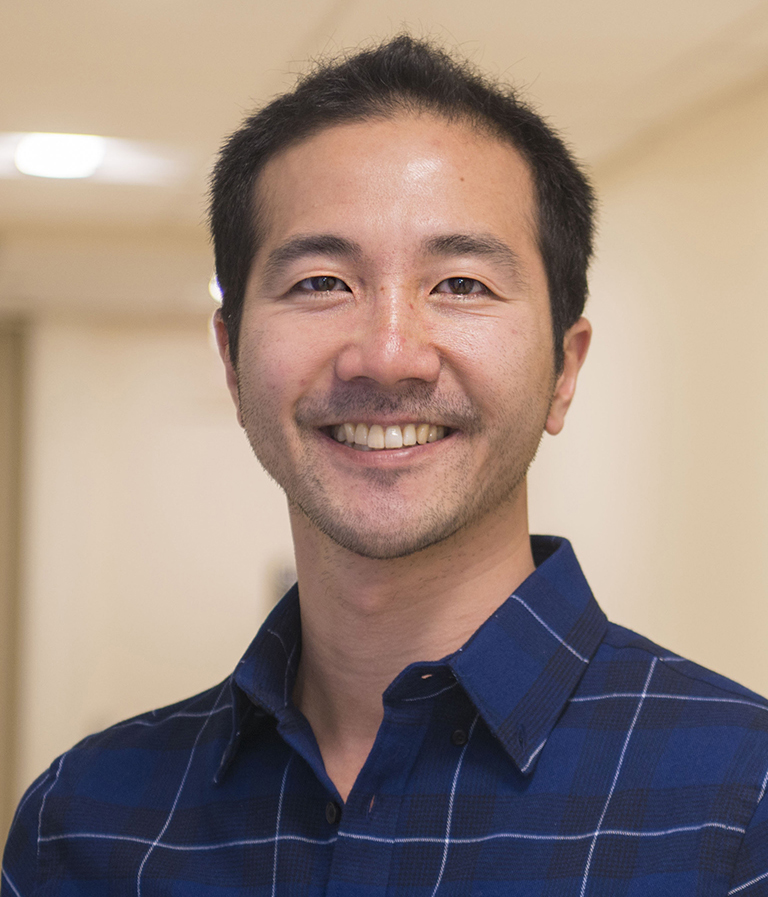- Home
- Team
Dr. Ayellet V. Segrè received her Ph.D. in Genetics and Genomics from Harvard University and did her postdoctoral training at Massachusetts General Hospital and the Broad Institute of Harvard and MIT on genetic and pathway analysis of complex diseases. In 2013, she joined the core team of the Genotype Tissue Expression (GTEx) Project at the Broad Institute, whose goal was to identify genetic variants that regulate gene expression (eQTLs) in a range of human tissues. As part of GTEx, Dr. Segrè led the computational production of the genotype data and the consortium’s efforts in integrating eQTL with GWAS data to gain biological insights on the causal regulatory mechanisms of complex diseases and traits. Since the Fall of 2017, Dr. Segrè is a member of the Faculty of Ophthalmology at Harvard Medical School, and an Assistant Scientist at the Department of Ophthalmology at Mass Eye and Ear, where she leads the genetic biostatistics and -omics efforts within the Ocular Genomics Institute.
Dr. Segrè is interested in using human genetics, functional genomics, and systems biology approaches to uncover the genetic risk factors and biological processes that lead to common eye diseases and patient-specific drug response. The goal of this is work is to identify new testable drug targets and help design personalized eye treatments. To address these problems, Dr. Segrè’s lab is focused on developing and applying computational methods that integrate whole genome association studies of complex eye diseases, such as age-related macular degeneration, glaucoma, and diabetic retinopathy, with epigenetic and RNA-sequencing data from human eye tissues.
Dr. Elizabeth Engle is a Senior Associate in Neurology and Principal Investigator in the F.M. Kirby Neurobiology Center at Boston Children’s Hospital, Professor of Neurology and Ophthalmology at Harvard Medical School, and Investigator of the Howard Hughes Medical Institute.
Dr. Elizabeth Engle is one of the world’s leading authorities on the genetics of eye and facial movement disorders. Her ground-breaking research has uncovered the clinical features and genetic causes of rare forms of congenital strabismus (misaligned eyes), ptosis (drooping eyelids), and facial weakness and led to the definition of a new category of human malformation syndromes, known as the “Congenital Cranial Dysinnervation Disorders” (CCDDs). Dr. Engle has identified the genes mutated in multiple CCDDs and demonstrated that these disorders can result from errors in the growth and development of motor neurons (brain cells that guide movement) and their cranial nerves as they extend from the brainstem to the eye muscles. Her studies of these orphan disorders have dramatically advanced our knowledge not only of these specific disorders, but also of steps critical to human motor neuron and brainstem development. Dr. Engle also studies the genetic basis of common forms of strabismus, a problem that affects up to five percent of the general population.
Dr. Engle is Professor of Neurology and Ophthalmology at Harvard Medical School, Investigator of the Howard Hughes Medical Institute, and an Associate Member of the Broad Institute. At Boston Children’s Hospital, she is a member of the Departments of Neurology, Ophthalmology, and Medicine (Genetics) and the F.M. Kirby Neurobiology Center and Program in Genomics and Senior Investigator for The Manton Center for Orphan Disease Research.
Selected Publications:
https://www.ncbi.nlm.nih.gov/myncbi/elizabeth.engle.1/bibliography/public/
Dr. Eric Pierce received his Ph.D. in Biochemistry from the University of Wisconsin-Madison and his M.D. from Harvard Medical School. He did his residency in Ophthalmology at Harvard and fellowship in Pediatric Ophthalmology at Children’s Hospital, Boston where he also took his first faculty position. He was then recruited to the department of Ophthalmology at the University of Pennsylvania School of Medicine, where he was promoted to Associate Professor with tenure. He returned to Harvard in 2011 to establish the Ocular Genomics Institute.
Dr. Pierce is an ophthalmologist and molecular geneticist whose research program is dedicated to understanding the molecular mechanisms of inherited retinal degenerations (IRDs), and improving therapeutic interventions for these conditions. IRDs are a leading cause of blindness worldwide, and are characterized by progressive dysfunction and death of retinal photoreceptor cells.
Dr. Pierce’s research program is focused on identifying new IRD disease genes, investigating the mechanism by which mutations in the identified genes lead to blindness, and using this information about disease pathogenesis to develop rational therapies to prevent vision loss.
Selected Publications:
Dr. Wiggs received her Ph.D. in Biochemistry from the University of California, Berkeley and her M.D. from Harvard Medical School. She did her residency in Ophthalmology at Harvard and fellowships in Glaucoma (Mass Eye and Ear) and Medical Genetics (Tufts). Dr. Wiggs is clinically board certified in both Ophthalmology and Medical Genetics.
Dr. Wiggs is a physician scientist whose research program is dedicated to understanding the molecular mechanisms of glaucoma, including both early-onset glaucoma caused by highly penetrant alleles and common age-related glaucoma with complex inheritance. Dr. Wiggs is the PI of the NEIGHBORHOOD consortium contributing over 10,000 samples for genetic analyses.
Selected Publications:
Dr. Jason Comander is an Alumni of Harvard University and Harvard Medical School, where he also did his residency and fellowship in Ophthalmology. Jason’s research focuses on understanding the genetic causes of inherited retinal degenerations in order to develop better diagnostic treatment options. Dr. Comander is currently working on several projects, including:
- Genetic heterogeneity among patients with pericentral retinitis pigmentosa
- Functional characterization of human genetic variation in retinitis pigmentosa
- Translating optogenetic vision restoration therapies to a primate model (collaborator)
Jason is a member of the Mass. Eye and Ear Retina and Electroretinography Services. For more information on his clinic or to schedule an appointment, patients should click here.
Selected Publications:
Dr. Kinga Bujakowska earned her PhD in Molecular Genetics from the University College London, UK, where she studied the disease mechanism of a specific form of Retinitis Pigmentosa caused by mutations in the splicing factor gene PRPF31. She did her first post-doctoral training in the Insitut de la Vision, France, where she was involved in mapping new genetic defects in patients with Retinitis Pigmentosa and Congenital Stationary Night Blindness.
Kinga joined the Ocular Genomics Institute in September 2012, where she is involved in the genetic characterization of patients with inherited retinal degenerations.
Selected Publications:
Dr. Vandenberghe is trained as an engineer in biological sciences and received his Ph.D. in Biomedical Sciences from the Katholieke Universiteit Leuven in Belgium. His doctoral work focused on structure-function studies of the adeno-associated virus (AAV) and its use as a gene therapy vector in the Gene Therapy Program at the University of Pennsylvania (Penn). Shortly after his Ph.D., he was appointed Director of Translational Research of Penn’s Gene Therapy Program. Afterwards, Dr. Vandenberghe remained at Penn but joined the Kirby Center for Molecular Ophthalmology as a Senior Scientist. In 2012, Dr. Vandenberghe joined the faculty at Harvard where he directs the Gene Therapy Center and joined the leadership of the Ocular Genomics Institute.
Dr. Vandenberghe is a virologist and molecular engineer whose research is driven by the aspiration to broaden gene therapy approaches for blinding disorders. His bench-to-bedside program works in three main areas:
1. Biology and host response of gene transfer.
2. Development of enabling technologies to improve therapeutic gene transfer.
3. Translation of specific therapeutic programs for blinding disorders.
Selected Publications:
Dr. Marcela Garita-Hernandez, PharmD., PhD is a cell and gene therapist for inherited retinal diseases (IRDs) with a strong research background in stem cell biology and retinal differentiation. She has worked with stem cells from different sources since 2005 and evolved professionally along with the field of retinal differentiation from 2D adherent cultures to self-organizing 3D micro physiological systems such as the retinal organoid model. She pursued her PhD in cell therapy and regenerative medicine under the supervision of Shomi Bhattacharya at the Andalusian Center of Molecular Biology and Regenerative Medicine in Seville, Spain, followed by postdoctoral stages at the Institute de la Vision in Paris and the Institute des Neurosciences de Montpellier in France. Her primary objective is to unravel the mechanisms underlying photoreceptor cell death and retinal degeneration, with the ultimate goal of advancing novel genetic therapies. In 2021, she became an emergent group leader at the Ocular Genomics Institute (OGI), dedicating her research efforts to the development and characterization of human disease models of IRDs. Her science combines pluripotent stem cell technologies, genome editing, optogenetics, and other gene therapy tools to modify retinal organoids and retinal pigment epithelial cells of human origin. Marcela is the director of the iPS Research program and a group leader at the OGI, directed by Eric A. Pierce
Selected Publications:
- Sanjurjo-Soriano, C., Erkilic, N., Damodar, K. Hassan Boukhaddaoui,, Diakatou, M., Garita-Hernandez, M., Mamaeva, D., Dubois, G., Jazouli, Z., Jimenez-Medina, C., Goureau, O., Meunier I., Kalatzis, V. Retinoic acid delays initial photoreceptor differentiation and results in a highly structured mature retinal organoid. Stem Cell Res Ther 13, 478 (2022). https://doi.org/10.1186/s13287-022-03146-x
- Garita-Hernandez, M., Chaffiol, A., Guibbal, L., Routet, F., Khabou, H., Toualbi, L., Riancho L., J., Sahel, J.-A., Duebel, Goureau, O., Dalkara, D. Control of microbial opsin expression in stem cell derived cones for improved outcomes in cell therapy. Frontiers in Cellular Neurosciences (2021) # Corresponding Author
- Garita-Hernandez, M., Routet, F., Guibbal, L., Khabou, H., Toualbi, L., Riancho L., Reichman, S., Duebel, J., Sahel, J.-A., Goureau, O., Dalkara, D. AAV-mediated gene delivery to 3D retinal organoids derived from human induced pluripotent stem cells. International Journal of Molecular Sciences (2020) 21(3):994 doi: 10.3390/ijms21030994
- https://www.ncbi.nlm.nih.gov/pmc/?term=marcela+garita
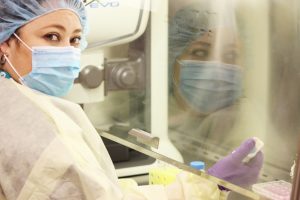
Grant support
Knights Templar Eye Foundation Career-Starter Research Grants (2022-2023)
Knights Templar Eye Foundation Competitive Renewal Grants (2023-2024)
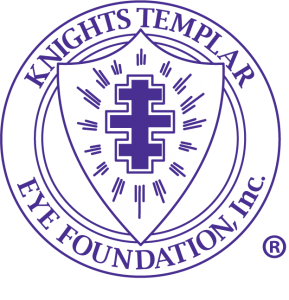
Dr. Liu was a trained Ophthalmologist and received her PhD on Molecular Ophthalmology from Peking Union Medical College in Beijing, China. Dr. Liu did her postdoctoral training at the F.M. Kirby Center for Molecular Ophthalmology at the Perelman School of Medicine at the University of Pennsylvania.
Dr. Liu’s previous research was focused on improving the understanding of the genetic causes and the molecular bases of inherited retinal degenerations (IRDs) using a combination of genetically modified animal models and molecular biologic approaches. Her work on photoreceptor sensory cilium and retinitis pigmentosa 1 laid the groundwork for many studies to follow. Her research program is dedicated to gain a better understanding of molecular mechanisms underlying IRDs and related ciliopathies, and to overcome hurdles of conventional AAV-mediated gene augmentation therapy for treating dominant IRDs and recessive IRDs that are caused by mutations in large genes. Her recent studies on the development of CRISPR/Cas9-based genome editing strategies provide a start point for facilitating translation of therapeutic gene editing programs into IRD therapies in human.
Selected Publications:
Li P, Kleinstiver BP, Leon MY, Prew MS, Navarro-Gomez D, Greenwald SH, Pierce EA, Joung JK, Liu Q. Allele-specific editing of rhodopsin P23H knock-in mice broadens therapeutic potential of CRISPR/Cas for dominant genetic diseases. CRISPR Journal 1:55-64, 2018.
Dr. Rachel Huckfeldt received her MD and PhD from Washington University in St. Louis. She did her residency in Ophthalmology at Harvard Medical School followed a research fellowship with Dr. Jean Bennett (University of Pennsylvania) and clinical fellowships in Medical Retina (University of Iowa) and Inherited Retinal Disorders (Mass Eye and Ear).
Dr. Huckfeldt is a member of the Mass Eye and Ear Retina and Inherited Retinal Disorders (IRD) Services and has clinical practices in medical retina and inherited retinal disorders. She is the institutional leader for many of the natural history and interventional clinic trials currently active on the IRD Service.
Dr. Huckfeldt’s research interests include understanding genotype-phenotype relationships in patients with inherited retinal degenerations as well as developing a better mechanistic understanding of retinitis pigmentosa-associated cystoid macular edema so that more effective therapies can be employed.
Selected Publications:
Dr. Amamoto received his B.S. from the University of Illinois, Urbana-Champaign and subsequently spent one year at EPFL in Switzerland as a Fulbright Fellow. In 2017, he obtained his Ph.D. from the Biological and Biomedical Program at Harvard University. His thesis work with Dr. Paola Arlotta investigated the extent of brain regeneration in the salamander, axolotl. He then completed his postdoctoral fellowship with Dr. Connie Cepko in the Department of Genetics at Harvard Medical School. During this training period, he discovered a novel role for Retinoic Acid signaling in promoting cone survival in mouse models of Retinitis Pigmentosa. Concurrently, he developed two new methods (Probe-Seq and FIN-Seq) that facilitate cell type-specific transcriptional profiling from organs and organisms of choice.
Selected Publications:

